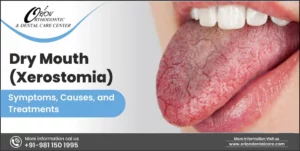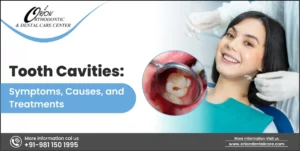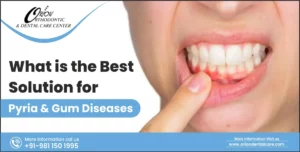Having problems while biting into your favourite ice cream? Do you feel a sharp pain while you sip your hot tea? Any discomfort or pain when the teeth get in contact with hot, cold, sour or sweet, that means your teeth have become sensitive and need help. It happens even while performing activities such as brushing and flossing.
Sensitive teeth are due to wearing of tooth enamel that exposes the dentin layer. Exposure of dentin causes sensitivity as the nerves can directly feel the food causing this temporary effect.
It is observed that most of us experience tooth sensitivity at some or the other time. Excessive grinding, vigorous brushing or acid erosions are some of the causes of such sensitivity.
Knowing the exact cause, treating or curing them accordingly with the help of an experienced dentist is necessary else it may trigger the onset of other oral health issues.
Table of Contents
Feel free to skip ahead if one topic catches your eye:
- What is Teeth Sensitivity?
- What Causes Tooth Sensitivity?
- Signs and Symptoms
- When to see a doctor?
- How to treat sensitive teeth?
1. What is Teeth Sensitivity?
Dentin hypersensitivity or dental sensitivity are other names of tooth sensitivity. Certain studies suggest that around 10-30% of the population regularly have dentin hypersensitivity.
It can start at any time and can be seen in all age groups right from children to teenagers to aged adults. It is observed that tooth sensitivity is more commonly seen in women than men. Dental sensitivity can affect even a single tooth or set of teeth.
We can define dentin hypersensitivity as short, sharp pain arising from exposed dentine, typically in response to chemical, thermal or osmotic stimuli that cannot be explained. Here, hypersensitivity means that the dentine is exposed and the pulp is accessible to damage.
Generally, The enamel layer covers the crown of the tooth and the tooth is cushioned over the gums or gingiva. Sometimes, the gums move back or recede and part of the enamel layer at the meeting place of the tooth and the gum wears off easily. This is because the enamel layer in that region is very thin. This erosion of the enamel layer causes the inner dentine to get exposed.
The dentine has numerous microscopic tubules or channels that lead to the nerve centre or the pulp. The exposed dentine tubules pass the stimuli such as hot, sweet, sour or cold to the nerves. The nerves are sensitive to such stimuli causing sharp pain and discomfort. One can experience mild to severe pain even for several hours.
Dentin hypersensitivity is a warning signal for more serious dental problems. If the pulp and the dentine layer is exposed for a long duration and left untreated, the tooth can be vulnerable to further damage causing oral health problems such as gingivitis, periodontitis, tooth caries, etc.
| Also Read: What are Some Serious Dental Problems? |
2. What Causes Tooth Sensitivity?
It is clear that sensitivity is a result of exposure to dentine due to the erosion of enamel. Causes of sensitive teeth can be related to lifestyle and oral hygiene habits. These habits lead to wearing out of the upper enamel. Some of the causes are mentioned below.
- Using a hard toothbrush – Brushing hard, improper brushing or using a hard toothbrush can cause wearing of the protective enamel especially where the teeth meets the gums. The exposed dentine can further result in sensitivity.
- Acid refluxes – When acids of the stomach get in touch with the teeth, an acidic oral environment is created within the mouth that can cause erosion of the enamel layer. The tooth’s enamel layer is sensitive to acids. Acidic foods and beverages also wear out the enamel leading to sensitivity.
- Oral hygiene issues – When plaque stays on the teeth, it hardens to form tartar. People with oral hygiene problems can face tooth sensitivity. The tartar piles up around the gums and teeth. These pockets of tartar can either cause the gums to recede and cause gum problems or can damage the tooth immensely. In both cases, erosion of enamel can cause exposure to the pulp region.
| Also Read: What is the Best Solution for Pyria and Gum Diseases?|
- Grinding of teeth – People with a habit of clenching and grinding the teeth together can have sensitivity. As constant grinding can wear out the enamel layer.
- Tooth problems – Cracked teeth can make the tooth sensitive to extreme temperatures. People having issues such as broken teeth, chipped teeth, tooth decay can leave the dentine layer exposed causing tooth sensitivity.
- Improper tooth fillings – Sometimes the temporary tooth filling during certain dental procedures can wear out. This wearing out exposes the pulp region to food causing sensitivity and pain.
Teeth whitening and sensitivity –Tooth cleaning procedures and teeth whitening treatmentsare also the reasons for sensitive teeth that can cause temporary effects.
3. Signs and Symptoms
Tooth sensitivity is generally seen when the teeth get in contact with hot, cold, acidic and sweet substances. Sometimes sensitive tooth pain is experienced even when cold air passes through the mouth. Some of the sensitive teeth symptoms can potentially trigger chronic dental and health issues.
- Potential complications of sensitive teeth – We understand that tooth sensitivity can impact the quality of life. Tooth damage, injury or gum related concerns that lead to sensitivity can damage the layers of teeth and further enhance pain in inturn spreading infection. This can affect the food habits, oral hygiene leading to weight loss
Sometimes, acid refluxes do cause enamel erosion that can be because of underlying stomach problems like bulimia or gastroesophageal acid reflux disease (GERD).
Sometimes, damage of the tooth and constant sensitivity can cause cavities or even loss of tooth. Some of the symptoms that occur along with teeth sensitivity can be summarized as below:
- Oral symptoms – The teeth get extremely sensitive to extreme temperatures, acidic foods. This sensitivity can further lead to bad breath, changes in taste, redness, gum inflammation, tooth decay, gingivitis, periodontitis, pus discharge from the tooth. These symptoms indicate serious dental problems.
- Jaw related issues – Sometimes, sensitive teeth can show unusual signs like clicking noise while opening or closing of the jaw, jaw pain and inability to open the jaw completely.
- Medical symptoms – Tooth sensitivity is accompanied by health issues like indigestion, heartburn, pain in the facial muscles, sinus problems, and even loss of weight
Serious medical conditions – Certain symptoms of teeth sensitivity when untreated or ignored can indicate very serious or life-threatening complications. In such conditions, you will need to seek immediate medical care or emergency. These conditions include swelling of the jaw, severe jaw pain, restricted mobility of the jaw, difficulty while breathing, high fever of more than 100 degree Fahrenheit, a feeling of unconsciousness, Blood in stools, etc.
4. When to see a doctor?
People generally do not anticipate the serious impact that teeth sensitivity can bring along.It is required to see the dentist immediately as and when the tooth starts to feel the pain. Discomfort while eating and drinking should be addressed with immediate care. Checking with the doctor for the teeth sensitive causes is essential to treat the tooth accordingly. You will need to visit the dentist in Delhi to ensure minimal effects, if you observe any one of the following conditions :
- Difficulty in Regular cleaning or flossing of teeth.
- Brushing gives you immense pain.
- Persistent bad breath, tooth decay or cavity.
- When you find your teeth widening apart or tooth loosening because of various reasons.
- Presence of plaque or tartar on the gums and tooth.
- Bleeding of gums, swelling and receding gum.
- Formation of pus on the gums.
- Toothache is associated with high fever and headache.
- Broken, cracked or chipped tooth.
- When jaw related issues like jaw pain, swelling in the jaw, reduced mobility of jaw, etc.
- If you have had GERD or bulimia or any stomach problem where the stomach acids have got in touch with the teeth.
- When you have sensitivity, unable to eat and losing weight consecutively.
- When tooth pain is accompanied by heartburn, indigestion.
- Pain and discomfort in the tooth aggravate facial muscular pain and even sinus problems, breathing difficulty. It is necessary to check with your doctor about the reason for such pain and how it has led to such severity.
- Sometimes the severity of tooth sensitivity can lead to blood in stools. When you observe bloody stools along with tooth pain, that means you need to check with the doctor immediately.
5. How to treat sensitive teeth?
There are options like lifestyle changes and change in oral maintenance that can help subdue tooth sensitivity. However, visiting the dentist to check with the actual condition is always advisable. During your visit to the dentist, your doctor will check the symptoms, find the root cause of the problem and let you know how severe this condition could be. Some of the treatment options recommended are :
- Desensitizing toothpaste – There is over-the-counter toothpaste available for sensitive teeth that block the pain associated with sensitive teeth. The dentist too will advise you with one.
- Fluoride gels – The dentist will recommend the application of fluoride gels that helps strengthen the enamel, covers the dentine, and acts as a barrier against possible pain.
- Dental cement – Composites or dental cement will help seal the tubules of the dentine that can prevent further damage and sensitivity.
- Desensitizing fillings – The exposed dentine can be strengthened by applying a bonding resin that can provide sensitive teeth pain relief. This application may require the use of local anesthesia
- Mouthguard – If the cause of tooth sensitivity is due to excessive grinding of teeth, mouth guards can help avoid tooth fracture or chipping off of the tooth.
- Surgical gum grafting – In cases where the gum tissue is damaged, gum grafting can be done to protect the exposed root surfaces and reduce sensitivity.
- Filling of the roots – tooth decay can be removed and filled with fillers that can avoid further damage to the tooth.
- Root Canal Treatment – It is the most effective treatment procedure for tooth sensitivity where the root pulp is cleared from infections, sealed and capped to discard any infections or damage ahead.
To prevent recurrence of sensitivity, Certain habitual changes for better oral hygiene is advised.
- Gently brush the teeth twice a day with a soft toothbrush for sensitive teeth and toothpaste rich in fluoride. Even use of mouthwash for sensitive teeth pain relief is advised.
- Following a healthy diet with inclusion of less acidic foods can protect the teeth enamel.
- Calcium for teeth sensitivity is essential. Foods rich in calcium or calcium therapy will help strengthen teeth and bone structures.
Take Away
Tooth sensitivity can cause acute and chronic effects that can lead to serious oral and health problems. Contact the best dental clinic in Delhito find the exact root cause of tooth sensitivity and get timely treatment done to avert complications that are associated with sensitive teeth. At Orion Dental care, our expert team of dentists will get you the right advice, tips to cure and devise a proper treatment plan for sensitivity and its severe effects.





